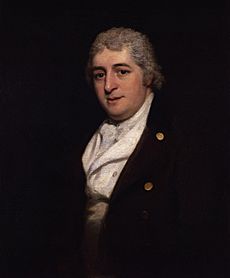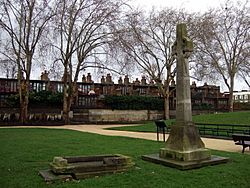Charles Dibdin facts for kids

Charles Dibdin (born before March 4, 1745 – died July 25, 1814) was a talented English artist. He was a composer, musician, writer, singer, and actor. He wrote over 600 songs, often creating both the words and music himself. He was known as the most productive English singer-songwriter of his time.
Dibdin is famous for his song "Tom Bowling." This is one of his many sea songs, often played at the Last Night of the Proms. He also wrote about 30 plays, including the operas The Waterman (1774) and The Quaker (1775). Famous composers like Haydn and Beethoven admired his work.
Contents
Charles Dibdin's Life and Work
Early Life and First Successes
Charles Dibdin was born in Southampton in 1745. He was the son of a silversmith. He was said to be the youngest of eighteen children. His parents wanted him to become a church leader. So, they sent him to Winchester College. But Charles loved music more than anything else.
He had a "remarkably good voice" from a young age. People wanted him to sing at concerts even as a boy. He was a choir singer at Winchester Cathedral from 1756 to 1759. When he was fifteen, he moved to London. He started by tuning harpsichords. Soon, he became an actor and singer at the Theatre Royal, Covent Garden.
In 1762, Dibdin wrote his first play, The Shepherd's Artifice. He wrote both the words and music for this short opera. He also learned a lot about acting from watching David Garrick. In 1765, he got a big acting role in The Maid of the Mill. He was so popular that people even wore "Ralph" handkerchiefs, named after his character!
Dibdin also worked with playwright Isaac Bickerstaffe. He wrote music for Bickerstaffe's play Love in the City in 1767. Some musicians complained about his music. But Dr. Thomas Arne, a famous composer, defended Dibdin. He said they should encourage young talent.
Working with David Garrick at Drury Lane
By 1768, Dibdin left Covent Garden. David Garrick, a famous theatre manager, wanted Dibdin to work for him. Dibdin composed music for Garrick's play The Padlock in 1768. He also acted in it, playing the role of Mungo. This role became very popular.
In 1769, Dibdin wrote music for Garrick's Shakespeare Jubilee. He also composed for several other plays. These included The Recruiting Serjeant and The Maid the Mistress. He had a two-year contract to supply music for Ranelagh Gardens.
Dibdin continued to work with Garrick. In 1773, he adapted the French opera The Deserter. He added new songs to it without Garrick knowing. These songs were very successful. He also worked with Garrick to compose music for The Christmas Tale. During this time, he learned to compose music entirely in his mind. He would not write it down until it was finished.
Dibdin also wrote regularly for Sadler's Wells. He created songs for many shows there. His most famous opera, The Waterman, was produced in 1774. He sold the music for £30. His short opera The Quaker was also very popular in 1775. After several years, disagreements with Garrick ended their working relationship.
Sadler's Wells, Haymarket, and Covent Garden
Even after leaving Garrick, Dibdin kept creating successful works. In 1776, his comic opera The Seraglio was performed. It included the famous song 'Blow High, Blow Low'. He wrote many songs for Sadler's Wells in 1777.
In 1778, Thomas Harris, the Covent Garden manager, hired Dibdin. He became the Musical Director with a high salary of £10 a week. Dibdin tried to bring French-style short shows to the theatre. But his ideas were changed by others. His speaking pantomime The Touchstone was also greatly altered. However, Dibdin and Garrick became friends again during this time.
Dibdin continued to produce shows at Covent Garden. These included The Chelsea pensioners (1779) and The Shepherdess of the Alps (1780). He also adapted John Dryden's play Amphytrion into an opera.
The Royal Circus and Other Projects
Dibdin had an argument about payment with Harris. So, he decided to build his own theatre. This was the Royal Circus, later known as the Surrey Theatre. It combined stage shows with horse riding acts. Dibdin is said to have created the word "circus." He was the manager and would get a share of the profits.
Between 1782 and 1783, Dibdin hired about sixty children. They danced and sang in his lively shows at the Circus. He wrote many songs, pantomimes, and ballets for these productions. His opera Liberty Hall was performed in 1784. It included popular songs like "Jock Ratlin" and "The Bells of Aberdovey".
After three years, Dibdin had problems with his partners. He left the Circus in 1785. He tried to build another theatre, but a storm destroyed it. He also published a weekly magazine called The Devil, but it did not last long. His opera Harvest Home was performed in 1787.
One-Man Shows at King Street and Leicester Place
In 1788, Dibdin faced money problems. He thought about moving to India. His brother, Captain Thomas Dibdin, had died. This led Charles to write his most famous song, "Tom Bowling." He decided to stay in London and perform for the public himself.
He started a new type of one-man show. He would sit at a harpsichord on stage and sing his own songs. He would also tell stories. He called these "musical variety entertainments." His first show was The Whim of the Moment. He performed it from October 1788 to April 1789. He even performed while he was in prison for debt.
After 1795, he performed these shows at his own theatre, the Sans Souci Theatre. It was located in Leicester Place. He introduced many popular songs there, such as "Poor Jack" and "Saturday Night at Sea." These shows made him famous as a writer of song lyrics. He continued these shows for almost twenty years. He created eighteen new shows during this time. He never wrote down the music beforehand. He composed it all in his mind.
A writer named John Adolphus praised Dibdin's shows. He said Dibdin "pleased but instructed the public." He added that Dibdin's sea songs "raise the laugh and the tear." They taught people about kindness, courage, and trust.
How Dibdin Performed
Someone who saw Dibdin perform described him. He was a handsome man of medium height. He had a pleasant face and looked like a gentleman. He wore a blue coat, white vest, and black silk pants. His hair was powdered. He spoke in a relaxed, friendly way. He seemed like he was entertaining friends in a living room.
When he sang, he would lean close to his music book for a moment. Then he would lean back and sing without looking at the book. His voice was a baritone, not very loud but sweet. He sang simply, focusing on the words. He played a special instrument that sounded like a piano and an organ. It also had bells, a drum, a tambourine, and a gong. He could play these with special controls to make his music more interesting.
He would run onto the stage cheerfully, "like a friend who enters hastily to impart to you some good news."
War Songs and Later Years
Dibdin's patriotic sea songs were very important during the war with France. They were not work songs, but English ballads. They showed the friendship, love, patriotism, and courage of sailors. In 1803, the government gave him a pension of £200 a year. They wanted him to write "War Songs" to support the country against France.
Dibdin also wrote for other operas. These included The Cabinet (1803) and The British Fleet in 1342. His last play, The Round Robin, was performed in 1811. It included his popular song 'The standing toast'.
In 1805, he sold his theatre and opened a music shop. But the shop failed, and he went bankrupt. He retired from public life in 1805. He sold the rights to 360 of his songs for £1,800. He suffered a stroke in 1813. The government then gave him a pension of £200. He died on July 25, 1814, and was buried in St Martin's churchyard. His wife put a line from "Tom Bowling" on his grave.
Other Writings
Besides his music and plays, Dibdin wrote many books. These included his autobiography, Professional Life (1803). He also wrote a Complete History of the British Stage (1795). He wrote novels like The Devil (1785) and Hannah Hewitt (1792). He wrote over 1400 songs and about thirty plays.
Dibdin in Other Works
The tune of "Tom Bowling" is part of Sir Henry Wood's Fantasia on British Sea Songs. This is played at the Last Night of the Proms. In the novel The Adventures of Mr. Verdant Green, a character learns to row using a line from Dibdin's song "The Jolly Young Waterman." Famous singer Sir Charles Santley performed in Dibdin's opera The Waterman in 1911. In James Joyce's story "Eveline", a character sings from Dibdin's song 'The lass that loves a sailor'.
Family Life
Charles Dibdin had two sons, Charles and Thomas John Dibdin. They were also popular playwrights. Their works are sometimes confused with their father's. Through his son Thomas, Charles Dibdin is an ancestor of the British politician Michael Heseltine. He was also the uncle of the writer Thomas Frognall Dibdin.
Public Memorials

Seven years after Dibdin's death, people started a collection to build a monument for him. A large amount of money was raised. A monument was built at the Royal Hospital, Greenwich. Today, this is part of the Trinity Laban Conservatoire of Music and Dance.
British politician Michael Heseltine is a distant relative of Dibdin. He helped set up a statue of Dibdin in Greenwich.
In Southampton, there is a memorial plaque to Dibdin on Holyrood Church. It calls him a "native of Southampton, poet, dramatist and composer, author of Tom Bowling, Poor Jack and other sea songs."
In 1889, a Celtic cross memorial was built in St Martin's Gardens, Camden Town. This was done after his first tomb fell apart. A verse from "Tom Bowling" is written on it:
- His form was of the manliest beauty,
- His heart was kind and soft,
- Faithful, below, he did his duty;
- But now he's gone aloft.
In Joseph Grimaldi Park in Camden, there is also a musical memorial for Dibdin. It is next to one for Joseph Grimaldi.
Recordings of Dibdin's Music
Three recent music albums of Dibdin's work have been released by Retrospect Opera. The first, from 2017, includes Christmas Gambols. The second, from 2019, has The Jubilee and Queen Mab. The third, "The Wags", came out in 2021. All these recordings feature singer Simon Butteriss.
An older album from 1992 includes Dibdin's The Ephesian Matron. Many recordings of his most famous song, Tom Bowling, have also been made.
See also
 In Spanish: Charles Dibdin para niños
In Spanish: Charles Dibdin para niños
 | James Van Der Zee |
 | Alma Thomas |
 | Ellis Wilson |
 | Margaret Taylor-Burroughs |

